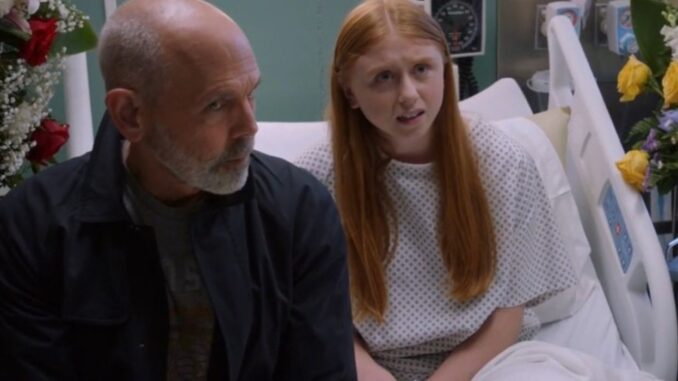
The hum of the NCIS bullpen was a familiar symphony: McGee’s rapid-fire typing, Bishop’s quiet intensity, Torres’s restless energy, and the ever-present, almost geological silence of Gibbs. Cases spun and unspun, villains were apprehended, justice was served, and the world, for all its chaos, felt anchored in the predictable rhythm of law enforcement.
Miles away, in a quiet bedroom, a different kind of silence was gathering. Emily, a name that carried the echo of youthful promise and unspoken burdens, lay amidst the soft disarray of blankets and discarded books. She wasn’t a criminal; she wasn’t a victim in the traditional sense, not yet. She was a girl adrift, buffeted by tides of anxiety and isolation that no NCIS database could ever log. The pressures of a world that seemed to demand perfection, the ghost of past hurts, the loneliness that gnawed at the edges of her brave smile – they had converged into a suffocating blanket.
Her decision wasn't a sudden, explosive act, but a quiet, desperate surrender. It had brewed for weeks, a bitter tea steeped in tears and sleepless nights. The handful of pills, harmless in their individual form, became a terrifying cocktail when consumed with a singular, terrible intent. She sought not oblivion, but a pause, a desperate quietus to the relentless internal noise. The world began to blur at the edges, colors softening, sounds fading, until even the weight of her own body felt distant, detached.
The discovery was a frantic, primal scream that tore through the sterile hospital air. A parent’s worst nightmare, played out under the harsh glare of fluorescent lights. The whispered words of doctors, the frantic beeps of machines, the agonizing wait outside an emergency room door – this was not a scene Gibbs or his team were trained for, not in their professional capacity. They dealt with the aftermath of violence, the cold logic of evidence, the pursuit of perpetrators. This was something else entirely: a battle fought not with firearms, but with fragile life, against an enemy that lurked within.
The call came to McGee, a voice choked with unspeakable fear and grief – not a suspect, not a witness, but a friend, a father, their long-time confidant, Tobias Fornell. "It's Emily," he'd rasped, "She… she overdosed. They don't know…" The words hung in the air, an invisible grenade detonating in the bullpen. The usual symphony died.
This was the NCIS moment no one expected.
It wasn’t a dramatic shootout in a warehouse, nor a high-stakes interrogation. It wasn’t a brilliant deduction or a last-minute rescue. It was the quiet, almost spectral arrival of the team at the hospital. Gibbs, usually a whirlwind of purposeful action, stood perfectly still by the sterile white wall, his hands clasped in front of him. His gaze, usually a flinty challenge, was soft with an age-old sorrow, a resonance of his own unbearable loss.
McGee, the analytical brain, sat hunched in a plastic chair, his face pale, his usual composure shattered. Bishop, the empath, her eyes glistening, simply held Fornell’s trembling hand, offering silent, unwavering support. Torres, the hardened field agent, who had seen humanity at its most depraved, leaned against a doorframe, his usual bravado gone, replaced by a profound, unvarnished empathy.
No tactical analysis, no rapid-fire questioning. Just presence. A shared breath, a collective intake of fear and hope. Fornell, a man who had faced down terrorists and killers, looked utterly broken, his broad shoulders slumped, his face streaked with tears he didn’t bother to hide. And Gibbs, the seemingly impenetrable rock, walked over to him.
He didn't speak. There were no words for this kind of pain. Instead, he simply placed a hand on Fornell's shoulder. It wasn't a patronizing pat or a casual gesture. It was a firm, solid anchor, a transfer of unspoken understanding. In that touch, there was the weight of shared grief, of knowing what it felt like to stand on the precipice of losing a child. It was a silent testament to a bond forged not just in duty, but in the crucible of life’s most devastating moments.
For a team so defined by its structure, its professionalism, its badges and guns, this was a stark unveiling. The uniforms faded, the rank became meaningless. They were just people, standing vigil for another human being, for a girl who had stumbled, for a father in agony. The unexpected moment was the stripping away of the NCIS persona, revealing the raw, vulnerable humanity beneath. It was the collective breath held, the unspoken prayers whispered, the unwavering support offered not as colleagues, but as friends, as family.
Emily’s fight for life continued behind closed doors. And outside, the NCIS team, for a precious, terrifying period, ceased to be agents and became something more profound: a testament to the unexpected depths of connection, a quiet bastion against the overwhelming tide of despair. In that sterile hospital hallway, under the humming fluorescent lights, they offered the most powerful form of justice they knew: unwavering human compassion.